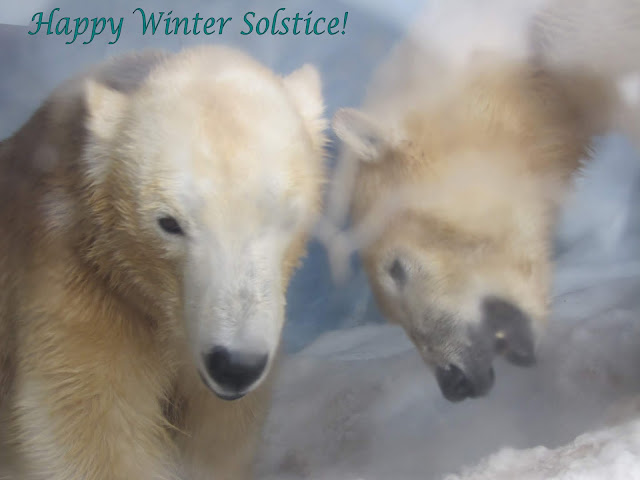 |
| Raspi and Flocke |
 |
| Flocke rests on top of the arch rock, to get a little break from Raspi (below) chasing her |
But fate brought Flocke and Rasputin together, and they are now quite the happy couple, living the good life on the French Riviera. Here is their story.
 |
| Baby Flocke, in a photo taken by Ralf Schedlbauer at Nuremburg Tiergarten, where she was born. |
Mom Vera had just turned five when she gave birth to Flocke, which may have been the youngest mother on record. That at invasive paparazzi at the polar bear area made Vera panic.
 |
Flocke learning to walk. Photo by Ralf Schedlbauer
at Nuremburg Tiergarten. Flocke was kept in an open black box,
to be more like a real bear den.
|
 |
| Petra, one of the four zookeepers who raised the little princess, plays with Flocke. Photo by Ralf Schedlbauer |
 |
| Flocke at about one year of age, playing with a jute bag. Photo by Manuela Ruthenberg |
Flocke grew up under the media spotlight, having been born a year after the famous Berlin polar bear cub Knut, who was now well past his babyhood. Knut was still beloved, but he had outgrown his cute baby looks. Flocke the Ice Princess became the new polar bear cub sensation.
 |
| Young Flocke. Photo by Manuela Ruthenberg |
 |
| Young Flocke takes a nap. Photo by Manuela Ruthenberg |
 |
| Flocke playing in the snow. Photo by Manuela Ruthenberg |
 |
| Young Flocke. Photo by Manuela Ruthenberg |
It was thought that a companion of the same age would help her in her development, so a young male bear was brought from Moscow when Flocke was a year old.
 |
| Young Rasputin. Photo by Manuela Ruthenburg |
Raspi was born in the Moscow Zoo about the same time as Flocke's birth, and raised by his mother, along with his twin. At the time, Rasputin and his brother didn't even have names, only numbers until polar bear #2892 was selected to come to Nuremburg, Germany for an extended stopover on his way to Spain.
 |
| Young Rasputin. Photo by Manuela Ruthenberg |
 |
| A fun winter in Nuremburg. Raspi with the bucket, and Flocke looks on. Photo by Manuela Ruthenberg |
 |
| Rasputin and Flocke in the snow. Photo by Manuela Ruthenberg |
 |
| Rasputin and Flocke were fond playmates. A companion was just what Flocke needed, and Rasputin was happy to be with his new friend. Photo by Manuela Ruthenberg |
 |
| Rasputin, who had grown up in a polar bear family with a brother, was teaching Flocke to be a polar bear. Photo by Manuela Ruthenberg |
 |
| Young Rasputin. Photo by Manuela Ruthenberg |
 |
| Raspi and Flocke at play. Photo by Manuela Ruthenberg |
 |
| Raspi has always been a swimmer. Photo by Manuela Ruthenberg |
 |
| It was a perfect match. Photo by Manuela Ruthenberg
The day of their introduction was well planned. The cubs had slowly been introduced to each other at a distance, and were allowed to sniff at each other through bars for many weeks. Everything went well. Then finally, Flocke and Raspi met face to face. The zoo had fire hoses ready in case the cubs needed to be separated, but no need. Right from the start, they adored each other.
|
 |
| Flocke tells Raspi what to do. Photo by Manuela Ruthenberg |
 |
| For Raspi, it was love at first sight. Photo by Manuela Ruthenberg |
 |
| Raspi leads the way. Photo by Manuela Ruthenberg |
 |
| Best friends. Photo by Manuela Ruthenberg |
 |
| At Marineland, two spacious enclosures to the left, and the mother cub enclosure below. |
 |
| Marineland had built two large ice grottoes, with a continuous supply of ice and snow for the bears. |
 |
| Flocke could see the Orcas from her window. |
 |
| Marineland has lovely deep pools for the bears |
 |
| Flocke and her daughter Hope play in the ice grotto |
With Raspi and Flocke moving south, Flocke's father Felix could return to Nuremburg from Denmark to be with Vera again. During the next few years, Vera gave birth to twin boys, Gregor and Aleut, and was a fine mother to them. More recently, she gave birth to daughter Charlotte, and again, was a very good mom. She had just been too young and nervous with Flocke.
 |
| Vera, Flocke's mother, still lives in Nuremburg, with Flocke's little sister Charlotte. |
 |
| Flocke with little Hope |
 |
| Flocke and Raspi together |
 |
| Raspi wants to see his Flocke, on the other side |
 |
| Flocke with her tiny daughter Hope, in the spring of 2015 |
 |
| Raspi swimming |
 |
| Raspi sniffing around. |
 |
| Raspi "talks" to Hope through the grate last year |
 |
| Raspi chases his Flocke up and down the hill, inside and out again. |
 |
| Flocke would find higher ground, and tell Raspi to keep his distance |
 |
| Raspi watches Flocke with devotion |
 |
| Raspi and Flocke frolic in a big pool |
 |
| Raspi is guarding Flocke, hoping she will come down to play |
 |
| Male bears get excited during breeding season. |
 |
| Flocke and Raspi - Yin and Yang |
And then Raspi will be on his own again for a while.
Sometimes, love is hard. But Raspi will always love his Flocke.
 |
| Raspi chases Flocke. Come and play, with me! |
Manuela's blog - click on this link























